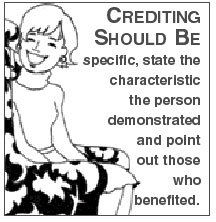Employees who require genuine crediting often have jobs that go unnoticed in retail furniture stores.

Three separate studies, conducted by Lawrence Lindahl in the 1940’s, Ken Kovach in 1980, and Bob Nelson in 1991, reported that employees tend to rank “full appreciation for work done” as the most important factor in the workplace. Conversely, in the same three studies, managers said that “good wages” was the factor that motivated their employees the most.
Earlier, psychologist William James’ own studies had moved him to state that the most important human need is to feel appreciated. Some years later psychologist Abraham Maslow would go on to say that although employees yearn to be credited, they loathe being credited undeservedly and look upon such crediting as insincere and condescending. He added that such unfounded crediting, far from motivating employees, has the opposite effect.
Too little deserved crediting takes place in retail home furnishings stores. This, in spite of Tom Peter’s insistence that though one undeserved credit is one too many, once a credit is deserved, “the sky is the limit,” One of Learning International’s, key seminars, “Interpersonal Managing Skills,” lists three essential elements that must be present if crediting is to be fully effective:
•Crediting should be specific.
•It should state the characteristic the person demonstrated in performing his or her work.
•It should point out those who benefited from that work.
Such three-part crediting can be both vertical and horizontal: Managers can credit their employees; employees can credit their managers; managers can credit their fellow managers; employees can credit their fellow employees; general managers and owners can credit everyone else in the organization; everyone else can credit the general manager and the owner. In the meantime, managers should keep in mind that the ones who require genuine crediting the most, are employees assigned the kind of jobs that often go unnoticed. Managers should not fall into the trap of believing that their employees already feel appreciated, because of corporate declarations in employee manuals or on large-lettered signs proclaiming that “Our people are number one.” I worked for an organization that had such a sign in its warehouse, yet the general manager daily passed through that warehouse without ever giving those “number ones” as much a kind glance or a kind word.
When three-part crediting is sincere, it is far more effective than an occasional pat on the back (although in some organizations even an occasional pat on the back would be a quantum leap!).
Unlike the pat on the back, a genuine credit gives its recipient a sense of direction: “Right on! Continue the great work you’re doing.” Not only does a genuine credit give a sense of direction, it also gives the recipient a sense of being valued and appreciated. Yearly evaluations are fine, but they can never contribute to the company-wide climate of feeling appreciated as much as can the company-wide practice of honest-to-goodness three-part crediting.
How sad that the original meaning of the word appreciation has been lost. Originally the word conveyed the root meaning of being valued, of feeling significant. The Austrian-born psychologist Alfred Adler, who happened to do some of his most important work in the United States, taught that all human beings strive for significance. We all instinctively know that Alfred Adler was right. We all want to feel that we belong, that we are “in on things,” that we play a significant role in our organization. That is what genuine crediting does, and that is the reason why Tom Peters was right when he stated that once a credit is deserved, the sky is the limit.
Corporate trainer, educator and speaker Dr. Peter A. Marino has written extensively on sales training techniques and their furniture retailing applications. Questions on any aspect of sales education can be sent to FURNITURE WORLD at pmarino@furninfo.com.